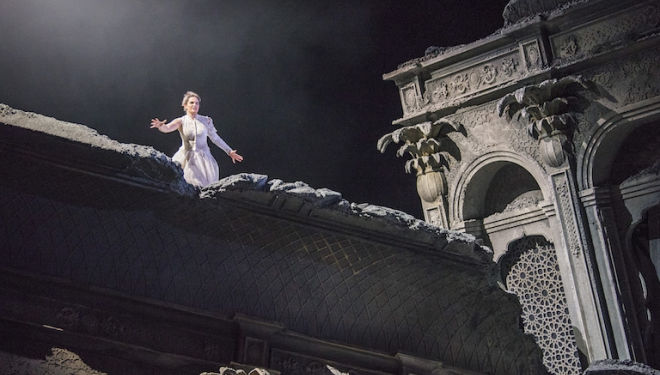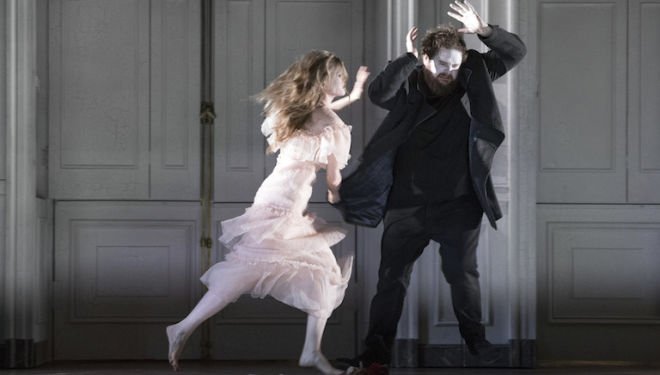
When Hipermestra defies her father, who wants to protect his position as king by ordering his 50 daughters to murder their 50 husbands, she fakes her bridegroom's slaughter and enables his escape. But when he returns with vengeance on his mind and an army at his side, the once lovely city state of Argos is ruined, its people dead or homeless.
The shattered Argos in Stuart Nunn's spectacular design combines all the luxurious elements of its first appearance, as wedding place and noble palace, with, later, the devastation of sites such as Palmyra or cities such as Homs. And in Graham Vick's production, the UK premiere, 360 – yes, 360 – years since its first performance in Florence, everything possible is done to connect our present lives with this apparently remote past.
So, in Glyndebourne's busy, dressy, foyer, long before curtain-up, TV screens of rolling new show footage of modern lands and rulers, voiced by TV presenter Julia Somerville (in the first night audience in person), right up to the arrival at the opera house itself of the paranoid king Danao. He is greeted on film by executive chairman Gus Christie, before passing through the Christie family box in the auditorium, as the audience settles down, and into the action on stage.
Vick is the grand master at such connectivity, and he also knows that we need light and shade, so for every helping of distress there is a dash of mirth. Mirth here comes mostly in the form of a grotesque older servant, and if, like me, you find a little sexually frustrated bearded lady goes a long way, you might tire of Mark Wilde's bosomy Berenice.
But it's the music of Cavalli that can beguile, although some may sense moments of longueur in the two-hour first half. Cavalli's is not a name that trips of every music-lover's tongue, but his conversational settings of internal thoughts, perhaps above all that moment of Hipermestra's self-doubt, as she surveys the devastation her loyalty to her new husband has caused, are at the root of modern opera.
William Christie, directing a madly busy, pared-down Orchestra of the Age of Enlightenment from the harpsichord, interprets in Hipermestra's reverie a moment of music that could go straight into this week's pop charts. And his miraculous musicians are totally bound up in the action, often joining characters on stage to add musical weight to their voiced argument, or themselves joined in the raised pit by those characters.
The very successful and powerful second half opens with a single, soulful and improvisatory violin playing in the ruins of Argos, before the tune is taken up by the others, only the civilising and humanising power of music staying the hand of a casual executioner.
Amid universally excellent singing, there are exceptional performances from the Portuguese soprano Ana Quintans as Hipermestra's companion Elisa, notable for her range of colour and beautiful phrasing, Italian counter-tenor Raffaele Pe as the saved husband Linceo, the Hungarian soprano Emöke Baráth in the title role, British tenor Benjamin Hulett as the jealous Arbante, and Italian baritone Renato Dolcini as feeble Danao.
From slapstick burlesque to shame and tragedy, sung in Italian with English surtitles, Hipermestra runs the gamut of emotions and experiences from alpha to omega, and has plenty to say about puffed-up, paranoid rulers, warring states. And it illustrates most pertinently what happens when a society collapses into a place of bullying, suspicion and isolation. Remind you of anybody?
Tickets for some performances of Hipermestra are still available. Click here for more details and booking.
| What | Hipermestra review, Glyndebourne Festival Opera |
| Where | Glyndebourne, Lewes, East Sussex, BN8 5UU | MAP |
| Nearest tube | Victoria (underground) |
| When |
20 May 17 – 08 Jul 17, times vary; three Sunday performances 3.55pm - 8.15pm; 10 weekday performances 5.10pm to 9.30pm |
| Price | £20 - £260 |
| Website | Click here for more information and booking |





